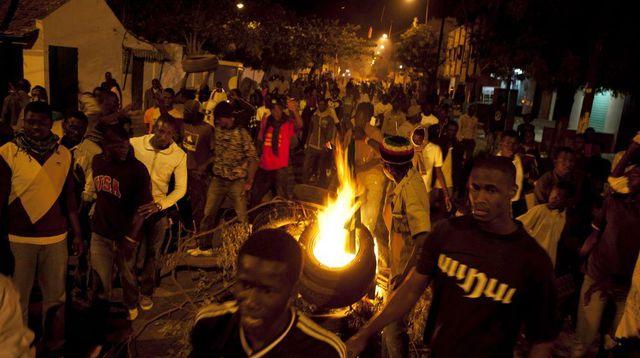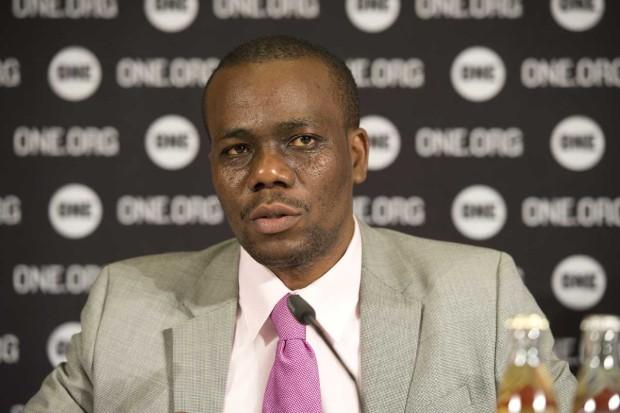
Debating Ideas is a new section that aims to reflect the values and editorial ethos of the African Arguments book series, publishing engaged, often radical, scholarship, original and activist writing from within the African continent and beyond. It will offer debates and engagements, contexts and controversies, and reviews and responses flowing from the African Arguments books.

Young Senegalese protesters in Dakar, 8 March 2021
Mamadou Dramé with contributions from Alcinda Honwana. Translated by Stephanie Kitchen.*
Everything everywhere is a banal morality tale which ends up as an affair of the state. In February 2021, a 20-year-old Senegalese young woman, Adji Rabi Sarr, accused Ousmane Sonko, a longstanding national Member of Parliament, of rape and formally made a charge against him with the national police who arrested the politician. When the affair exploded, 46-year-old Ousmane Sonko, the youngest candidate to run in the 2019 presidential election ending in third place, accused the head of state, Macky Sall, his interior minister, Antoine Felix Diome, and the Prosecutor of the Republic, Bassirou Gueye, of plotting to remove him.
This case, known as the ‘Sweet Beauty Affair’[1] plunged the country into chaos with three days of social unrest that resulted in 12 deaths and over 600 people injured, mostly young people. Thousands of young protesters came out to defend Sonko and demand his immediate release; the protesters did not demand justice for Adji, who is now in hiding, and watching her trauma being used to feed political conspiracies.
Ousmane Sonko is the popular leader of the political party Patriotes du Sénégal pour le Travail, l’Éthique et la Fraternité (PASTEF). PASTEF is part of the Mouvement de Défense de la Démocratie (M2D) a broader coalition of politicians and activists that is opposed to the regime of Macky Sall. Like Sonko, M2D enjoys a great deal of support from the country’s youth. Not surprisingly, therefore, following M2D calls for resistance and defence, young people from all regions and districts took to the streets in their localities to protest against Sonko’s arrest. For these young people, this was a clear confirmation that the President and his allies are stifling the opposition to prolong their rule.
Young people staged riots and targeted state buildings such as town halls, state-civil registry offices and police stations, challenging the forces of law and order and storming the building where Ousmane Sonko was being detained. Protestors appeared to be overwhelmingly male, which raises important questions about these political mobilisations such as whether this gender composition has any relation to the nature of the event that triggered these protests, or if women have historically eschewed such violent street demonstrations. Protestors also targeted the buildings of French companies like Auchan and Total, accusing the French government of influencing and colluding with the Senegalese government. These synchronised attacks on state and public buildings led to a harsh police crackdown that has been condemned by human rights organisations and the Minister of the Interior to claim that ‘occult forces’ have infiltrated the youth demonstrations.
How did we get here? What started as an alleged criminal case was quickly transformed into a major political issue with strong socio-economic, cultural and moral ramifications. The demonstrations that followed certainly became an expression of the longstanding anger and frustrations of the younger generation faced with increasing socio-economic hardship, political marginalisation and complete loss of confidence in the government and political leaders.
An economy worsened by the pandemic
In the past year, the Covid-19 pandemic has worsened the already precarious socio-economic situation in the country, especially with regard to employment and other opportunities for large sections of the country’s youth population. Young Senegalese have been experiencing serious challenges of unemployment, and inability to take charge of their futures through education and training. These problems have been exacerbated by the onset of the current pandemic, which has deprived many of their daily livelihoods. Activities such as peddling and sale of food on street corners, for example, were banned as part of the containment measures to prevent the spread of the virus. The pandemic also halted leisure and sports activities to which most young gravitate for entertainment and to momentarily escape from their daily struggles. The government-imposed curfew has been extremely difficult to survive due to the existing living conditions in many households and the weak socio-economic situation that required being out and about to make ends meet. This precarity might have influenced the looting and pillaging seen during the riots prompted by the ‘Sweet Beauty Affair’.
Questioning the neutrality of the justice system
Socio-economic problems are not the only reason that explain the unfurling of violence noted in Dakar and other cities in the country in March 2021. As indicated above, Sonko’s defence argued that the accusation was based on a political conspiracy aimed to neutralise a political enemy. An argument that easily gained traction in the eyes of the ‘conspiracists’, especially in lightof previous political-legal cases like those of Karim Wade and Khalifa Sall, both opposition leaders to the current regime, who have been charged and imprisoned for corruption, illicit enrichment and economic crimes. Indeed, like Karim Wade and Khalifa Sall, Ousmane Sonko is seen as a serious challenger to Macky Sall if he decides to run again in the 2024 elections. This is the reason why many people believe that the regime was very quick to lift Sonko’s parliamentary immunity to allow for his prosecution and subsequent detention on 3 March.
The neutrality of justice has thus been strongly questioned. Many young people remain convinced that the magistrates are in the service of the ruling party and constitute the strong arms of the President. The case of Seydina Fall (aka Bougazelli) illustrates this as after being convicted of trafficking fake notes Bougazelli, a member of parliament and close ally of the President, was set free just a few months later without finishing his sentence. It appears that Macky Sall is keen on reinforcing his power by using the justice system to protect his allies and clamp down on the opposition. At some point, the President made clear that he intends to ‘reduce the opposition to its simplest expression’, which the ‘conspiracists’ see as a sign of his intention to remain in power beyond his second mandate. Macky Sall is currently in his second five-year term, which will end in 2024 and according to the constitution he cannot stand again. However, the President has been very ambiguous about his political intentions for 2024. Despite pressures from the media and other circles for him to clarify his position, the President continues to adopt a ‘neither yes nor no’ posture.
This is precisely what young people do not want to hear. In 2011 there were youth demonstrations in Dakar against Abdoulaye Wade’s intention to amend the constitution to create the post of vice-President that would allow his son Karim Wade to succeed him. Young people, led by movements such as Y’en a Marre! (Enough!) and Touche Pas à Ma Constitution! (Don’t Touch My Constitution!) galvanised Senegalese society to oppose the constitutional amendment and came out victorious. The Movement 23 Juin (M23), a broader coalition of activists from various sectors of society, emerged in this period. There is a shared sentiment among young Senegalese that the President is using all tools at his disposal, including the justice system, to destroy his adversaries and maintain a political clientele to solidify his power. This is exacerbated by the view that foreign interests are favoured to the detriment of nationals and that foreigners are stealing jobs that young graduates should be occupying, thus the attacks on French companies and French interests during the recent demonstrations.
Young people in general have been disgruntled with the regime of Macky Sall that has failed to address their socio-economic concerns and has marginalised them from political developments. And the young are keen to challenge the current state of affairs and support Sonko and the M2D.
Influence of the media and tyranny of a single idea
If the mobilisation to the demonstrations has been massive, it is because of the influence of social media’s digital networks, which have played a substantive role in providing information, propaganda, disinformation and amplification of the events to the point where small incidents made a big impact on the mobilisation of people, especially young people. From the early hours of the explosion of ‘Sweet Beauty Affair’ social networks have been inundated with information about the ‘pseudo-conspiracy’ against Sonko as well as information about the politician’s sexual harassment, rape and links to the #MeToo movement. Social media’s information and disinformation unleashed distortions of the truth influencing citizens on either side to take their positions. Television stations are also not dead hands, finding here and there justifications for the ‘claimed conspiracy’, finding witnesses, substituting for the police or the magistrates in leading inquests and arriving at conclusions, often in the direction of a state conspiracy against Ousmane Sonko.
All this was rekindled by the leakage of the verbal interrogation done by the police, which was found on social networks like Facebook and WhatsApp sowing doubt in the minds of the people. Then there followed the spectacular resignation of the officer charged with hearing the protagonists, Captain Oumar Touré, who felt he was being pursued, tracked and in danger because of videos posted on his Facebook page.
Social networks have contributed to stirring the fire through dissemination of information, disinformation as well as the manipulation of information on both sides with the aim of harming the other party, of tarnishing their reputation and weakening either the prosecution or the defence. For example, a group of ‘Sonkolés’ or ‘Sonko Boys’ used networks such as Twitter, Facebook and WhatsApp to support Ousmane Sonko, slander adversaries and shield him from criticism. Thus, those who don’t share the same opinion and/or don’t have the same views are systematically attacked. In this environment, sharing opinions publicly makes one a ‘supporter’, a ‘collaborator’ or an ‘enemy’ with all the consequences that such positions will entail. Space for alternative positions and differing views appear to be very limited in this polarising context. This dictatorship of a single view ends up annihilating all willingness to see complexity and express depth of thought. This is why the former member of parliament Thierno Bocoum published an article titled ‘Freedom of expression is gravely threatened on social networks.’
The protests have been directly disseminated without journalists mediating the sensitivity of certain types of information such as the position of the law enforcers and their number, or the name and presumed location of the young accuser. But the battle for audience has sometimes taken the upper hand in relation to the responsibility of good journalism to engage in unbiased reporting. Conversely, the authorities have also gone against the freedom of the press by intimidating some journalists covering the affair. Despite the measures taken by the National Regulatory Council of Audio-visual Media to suspend some television channels, these continued to operate through social media networks, sharing images of the confrontations between protesters and the police and inviting guests the authorities had considered insurrectionary.
The return of social regulators
A major event in this affair was the intervention of ‘traditional’ social regulators, the marabouts (Muslim religious leaders). Often concealed and sometimes neglected, singularly consulted at times of electoral campaigns or religious events, the marabouts are well placed to defuse bombs that might threaten Senegalese society. The marabouts, as spiritual leaders have strong power and influence in Senegal; political groups and alliances are attached to specific spiritual leaders that provide guidance during troubled times. By taking the pilgrim’s baton, Ousmane Sonko’s marabout, Cheikh Abdou Mbacké, tried to reason with him to respond to the summons of the judge. President Macky Sall reached out to Serigne Mountakha Mbacké, the Chief marabout of the Mouride brotherhood, to explain that this was a private affair and that the state had nothing to do with the accusation.
A collective of marabouts mediated a dialogue involving the head of state and the protagonists to help calm down the situation. They managed to lower the temperature by lessening sanctions against some militants accused of violence and insults, focusing on restoring calm as well as law and order. Effectively, following the intervention of the marabouts, young people on all sides calmed down because young Senegalese, brought up under the influence of these religious brotherhoods, respect and believe in the power and importance of marabouts. These traditional regulatory institutions, which have been very important in traditional society, have shown once again that they still constitute powerful levers in conflict resolution and in bringing people together.
Conclusion
The anger provoked by the ‘Sweet Beauty Affair’, at once unpredicted and unforeseen at the moment when it arrived, has shown once again the fragilities of Senegalese society and the political system. The case itself is still ongoing. The investigation into Adji Sarr’s allegations continues and magistrates are yet to make their determination. Sarr, who is currently under police protection, recently reiterated her accusations in spite of the public outcry. Ousmane Sonko, and the young people arrested in the demonstrations have just been released on bail, but the charges of rape and incitement to insurgency against the parliamentarian have not been lifted.
Events since Sonko’s arrest show how the impact of the coronavirus pandemic has amplified the socio-economic and political problems confronting young people and the entire population. And this has driven the younger generation to demonstrate their anger publicly in the streets; these were violent demonstrations that turned a peaceful country like Senegal upside down, causing destruction, injuries and death. This agitation was not simply the result of a sexual assault case, but deeply rooted in Senegal’s longstanding socio-economic, cultural and political tensions, suspicions and fault lines. Mobilised young people, whose demographic makes up the majority of the country’s population, are right in the centre of these developments, suffering from the failure of socio-economic programmes, from mal-governance and political marginalisation and from restricted possibilities to envisage decent futures. These protestors are not keeping silent, they are coming out to voice their frustrations, embracing the positions they support and creating the alliances they need to fight for change. The M2D and Sonko seem to have understood these young people’s determination for change. After being release on bail on 8 March, Sonko called on young people to continue their anti-government protests, but in a peaceful manner, stating that ‘the revolution has already started, and nobody can stop it’.
End Notes
*Stephanie Kitchen is the managing editor at Debating Ideas – African Arguments and Africa, journal of the International African Institute. Alcinda Honwana is one of the Age of Agitation series co-editors; the views expressed in this article represent the author and do not necessarily represent the United Nations.
[1] Sweet Beauty is the place where the events would have taken place.






